- Common Quaker
-
Common Quaker 
Scientific classification Kingdom: Animalia Phylum: Arthropoda Class: Insecta Order: Lepidoptera Family: Noctuidae Genus: Orthosia Species: O. cerasi Binomial name Orthosia cerasi
Fabricius, 1775The Common Quaker (Orthosia cerasi) is a moth of the family Noctuidae. Some authors prefer the synonym Orthosia stabilis (Denis & Schiffermüller 1775). It is distributed throughout Europe and is also found in Turkey, Israel, Transcaucasia and eastern Siberia.
This is a variable species, the ground colour of the forewings ranging from greyish to orangey brown, sometimes with a broad dark band. The most distinctive features are two large stigmata, each edged by a narrow pale line, with a similarly coloured subterminal line. The hindwings are drab grey or brown. The wingspan is 34-40 mm. This moth flies at night in March and April [1] and is attracted to light and sugar.
The larva is bright green with yellow markings and feeds on various trees and shrubs including apple, buckthorn, elm, oak, pear, poplar and willow as well as various Prunus species. The species overwinters as a pupa.
- ^ The flight season refers to the British Isles. This may vary in other parts of the range.
References
- Chinery, Michael Collins Guide to the Insects of Britain and Western Europe 1986 (Reprinted 1991)
- Skinner, Bernard Colour Identification Guide to Moths of the British Isles 1984

This Hadeninae-related article is a stub. You can help Wikipedia by expanding it.

